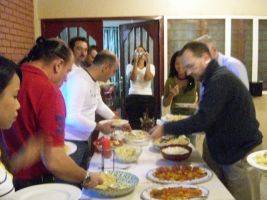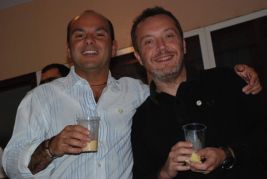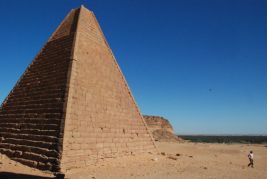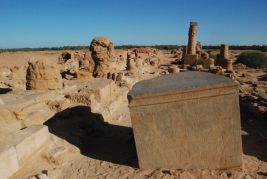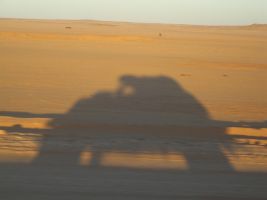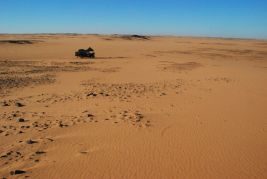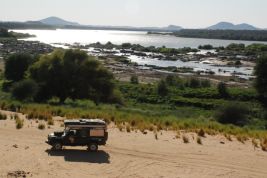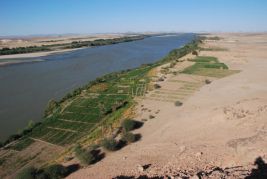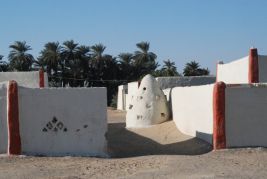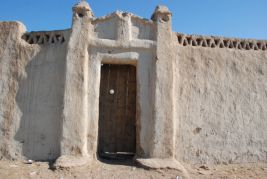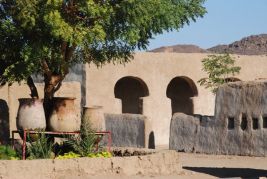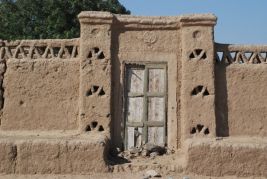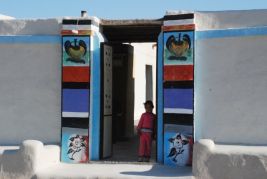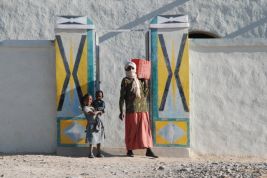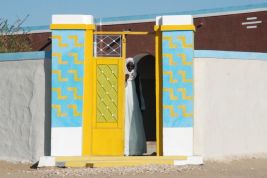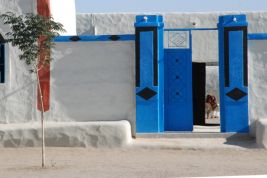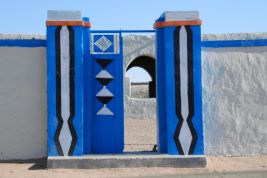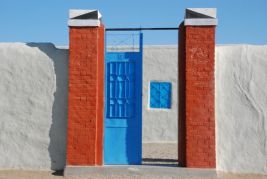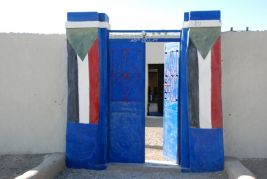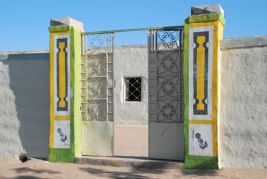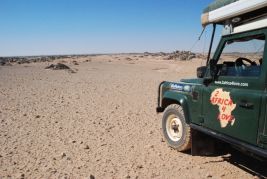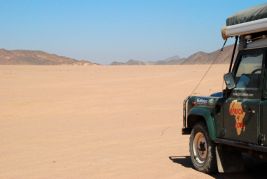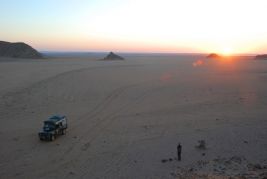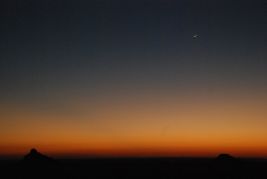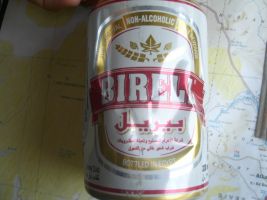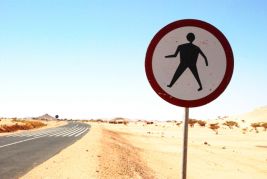
 Italia
Italia France
France Spain
Spain Morocco
Morocco Mauritania
Mauritania Senegal
Senegal Mali
Mali Burkina
Burkina Ghana
Ghana Togo
Togo Benin
Benin Nigeria
Nigeria Cameroon
Cameroon Gabon
Gabon Sao Tomè
Sao Tomè Gabon 2
Gabon 2 Congo
Congo Congo DCR
Congo DCR Angola
Angola Namibia
Namibia Sud Africa
Sud Africa Namibia 2
Namibia 2 Botswana
Botswana Zimbabwe
Zimbabwe Botswana 2
Botswana 2 Sud africa 2
Sud africa 2 Swaziland
Swaziland Mozambico
Mozambico Malawi
Malawi Tanzania
Tanzania Rwanda
Rwanda Uganda
Uganda Kenya
Kenya Etiopia
Etiopia Sudan
Sudan Egitto
Egitto Libia
Libia Tunisia
Tunisia Malta
Malta
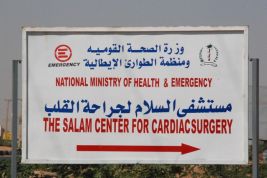
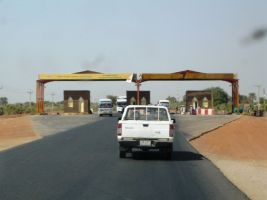
Tea at the frontier – 20 Dec 2008
Three crossings - immigration, customs and police.
The first one is quite quick, until a tray comes along with pizzas. Everyone disappears to the next room and after thirty minutes, they start again with greasy hands.
The second one is slightly slower, but we are offered an incredibly hot tea. While we are waiting for the tea to cool down, bureaucratic procedures are carried out; we then pay $7.
At the police office nobody speaks English; however, we understand that they want our pictures, which will be stuck on a piece of paper (just ripped out of an exercise book) where our fingerprints will be added. Someone was able to skip this last passage. No problem.
Soon after leaving customs, we are faced with one of the numerous roadblocks. You should carry local currency - at the frontier, the moneymakers made money by exchanging local currency applying a very high exchange rate (half the official value). Using the excuse that they do not understand the language, they let us through quite quickly without charging us.
We head north. The road is perfectly asphalted. A big relief for K7.
Onwards and Northwards!!
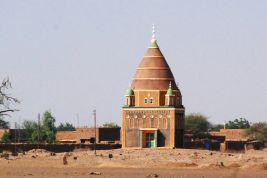
Gedafer – 21 Dec 2008
We regret the decision to have stopped in this place; the only decent place to stay, a 3-star hotel that charges 5-star prices… $90, not including breakfast, light, soap, towels and toilet paper; however, very poor service is included. It was simply useless requesting these essentials; being told they are finished. They do not allow you to camp in the car park.
The alternative hotels in the centre are like prison cells.
OUR ADVICE: keep driving for another 10 km outside the city and sleep in the desert. The place is nice, safe and cheaper.
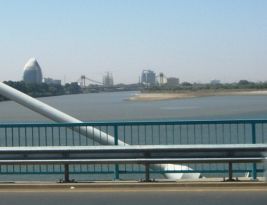
Khartoum - 22 Dec 2008
It is here were the two Nile Rivers meet - The Blue Nile and the White Nile. From this point, the river is simply called The River Nile and it will be with us for the next few weeks.
We quickly try to find the immigration office, but nobody knows exactly where it is (or more likely, everyone speaks Arabic and we do not understand). GPS N15 35.992 E32 31.087. When we finally manage to find the office, it has closed we are too late. We need to come back the next day.
You require a letter from the place were you are staying as a guarantee. At the Italian Embassy, service is fast and our data is transcribed into Arabic. We will use this document to apply for the Libyan Visas via e-mail.
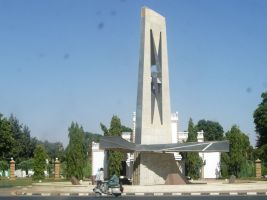
We search in vain for the office to declare our itinerary. We are told that this is not necessary in the North, but… you never know. After a few hours, we give up the search. We buy a SIM card for the telephone and we try to locate an internet point to update our website; apparently, a break in a phone cable in the Mediterranean has caused a total isolation of East Africa. We waste three days carrying out all of the above. We camp at the National Camping Centre, cheap but too basic. GPS N15 31.440 E32 34.220
We need to book a ferry from Wadi Halfa to North Sudan and the border into Egypt. There is only one ferry a week and places are few. Through the Midhat Mahir agency, we are able to make a booking “by word of mouth”. Midhat works with his brother Mazar and his uncle Magdi. They are helpful and reliable. mashansharti@yahoo.com - tel. 00249122181886 or 00249 912 253484
GPS N15°35.945’ E032°31.549’
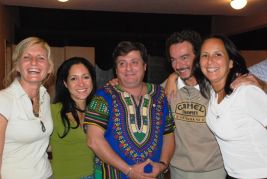
Christmas - 25 Dec 2008. 2008
After leaving friends behind us, we arrive in a city where we know no one; we are strangers here. Our desire to meet new people who are able to share moments of our journey gives us nostalgic feelings thinking of the friends that maybe we will never see again; just the warm memories of shared moments together, laughter and experiences shared.
Here are our beautiful Christmas hosts, Francesco and Jahzeel. Other new friends from the Italian embassy: to whom we make a toast… Toni and Gianfranco, Tonino, inventor of the “castle” and the evening on the roof. Manuela, with her solar smile, rule breaking and cheerfulness. The group from Emergency, Ombretta and Romina, Luca and Giorgio. MERRY CHRISTMAS!!
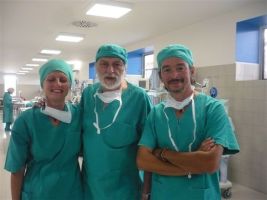
Emergency – Christmas 2008
Through a friend, we learn that on the outskirts of Khartoum, in Soba, there is a hospital run by “Emergency”. We pay a visit…
“…among those who repair the heart machines,
an autoclave is broken from the start,
hearts saved just in time
a hospital of practical Italians, the best of us…”
from “L’Ospite incallito” - (The inveterate guest) - a book of Italian poetry by Erri De Luca.
Quite out-of-the-blue, Gino Strada comes along and offers to take us to visit the operating theatre. Doctors are carrying-out an operation on a 16 year old, who needs to have a heart valve replaced. It is open-heart surgery, indescribable emotions, a truly remarkable experience, and an unforgettable Christmas gift.
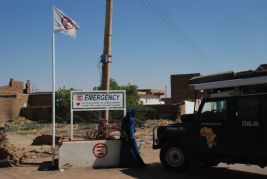
The hospital is located a few Kilometres from the capital. The contrast between the neglect on the outskirts and the impeccable organization and cleanness of the hospital are a striking reality. The standards are the best you could ask for. A place dedicated to heart surgery. Operations carried out to substitute or repair heart valves, which infant rheumatic fevers have damaged. “A new emergency that poor countries ignore” says Gino Strada, founder of Emergency. In this hospital, a team of doctors and nurses from all over the world carry out an average of four long and very delicate open-heart operations a day. A similar hospital in Bologna carries out a daily average of only one.
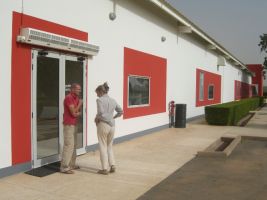
Many locals are employed, especially for general nursing and service activities. Considering how the hospital is highly specialised, it is not easy to find qualified doctors to cover the high responsibility roles. “We need more staff,” says Gino “…it isn’t easy finding the right people”. The “International volunteers” have a minimum contract of six months, they are regularly paid, and then they go back to their usual employment. Many are young people. The atmosphere is dynamic and efficient. We leave an Elfo token (details in solidarity)
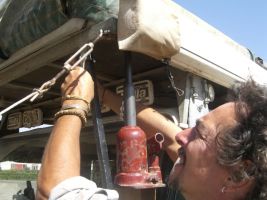
We are asked if we need any repairs to K7 and of course, we take advantage of their courtesy. A good welder strengthens the bonnet, which had cracked again. I restore a few broken bolts, some missing rivets and I repair the cover on the right disc brake; the left one had broken in South Africa.
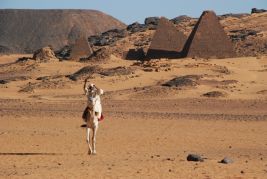
Meroe - 26 Dec 2008
Once again, we head north towards the desert. Here, there is early evidence and history of these ancient civilisations; these pyramids trace back to the Kush reign, the pre-Egyptian era; they were the cemeteries of the rich and powerful kings and princes.
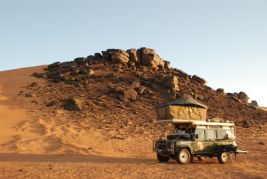
By this archaeological site the landscape is barren and wild. During the day, the temperature is pleasurably warm, but in the evening it is much cooler. The wind blowing about the tent doesn’t allow for a good nights sleep, so we try and look for shelter behind a hill.
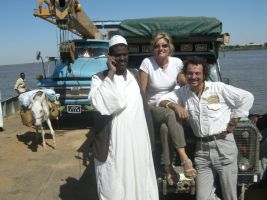
Ponton in Atbara
In Atbara, we abandon the track that follows the river and cross the Nile towards the Bayunda desert, a barge ferries us to the other side. An exuberant local insists on being a little bit too courteous with Laura. State and religious repression often has these men going into raptures over foreign women; just the touch of a hand. He wants to appear in our pictures, as the picture is about to be taken, unable to contain his excitement and in preparation for his immortalization, he whips-out his mobile phone.
Karima - 27 Dec 2008
Next to Karima there is the site Jebel Barkal, with higher pyramids and some remains of a temple. It isn’t very well kept, is very untidy and very dirty. Careless untidiness and rubbish do not honour these ruins, which need more attention and care from the dozens of government employees who prefer spending their time sipping tea in the shade.
These ruins date back to the “New Reign”, about 1500 years B.C.
A break in the hundreds of kilometres between one curve of the Nile and the other. Desert sand bivouacs in the immense silent spaces inhabited by the wind.
The Nile and the Cataracts
They are called “Cataracts”. Rapid waterfalls and emerging rocks, parts of the river that are impossible to navigate. There are six from Khartoum to the Mediterranean, making it impracticable for boats to move along the river. From higher up on a hill, you have a clearer picture and understanding of the importance of the Nile for the locals. How the river flows serves the land that surrounds it, and for many-many years life has and still depends upon it.
Nubia – 28 Dec. 2008
The Northern region of Sudan which engages with Egypt is called Nubia. For many years the population has resisted the invasion of the Egyptians. Only the Mammalucchi in the year 1.300 were able to stabilize their Islamic dominance.
Particular to this place, the antique architecture made of mud and bricks, and the more recent one, of plaster and colour.
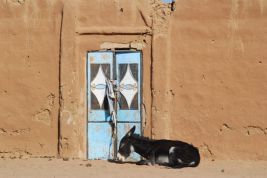
What we liked the most about these villages are the colourful entrances.
All the houses are protected by white walls with each entrance displaying a variety of different colours. These are some pictures of our favourites.
A desert of pink almost impalpable fine sand.
A desert of grey compacted pebbles and gravel.
It is always quite emotional crossing these deserted places.
Today, the route isn’t so pleasurable. But many worksites – mainly Chinese - are already in progress and in a couple of years, the track will be fast and comfortable.
Wady Halfa - 29 Dec 2008
It isn’t a very nice village this, by Lake Nasser. Wady Halfa exists as a result of the Egyptian dam. Here, you can embark towards Egypt. We get in contact with Mazar, the person who booked our passage on the boat with K7. Given that there aren’t any decent campsites and places to stay, we decide to camp in the nearby desert for two days.
We take the shelter of some rocks, under an immense beautiful moonlit sky.
GPS N21° 47.726’ E31° 24.960’
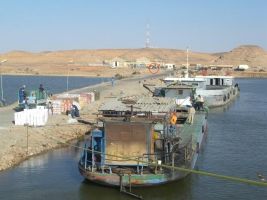
Boarding - 31 Dec 2008
We “quickly” carry out the formalities at customs. “Only” two and a half hours.
We board the passenger ship in a 1st class cabin for 70-dollars a head; almost “Spartan”. I won’t even bother describing the communal bathrooms. I ask myself why they call this 1st class, seeing that it is the only one. The alternative is an armchair or a windy bridge outside.
From the bow we can see the flatbed-ferry were our K7 will be loaded on to. We have closed everything and chained everything up and left the keys with Magdi, Mazar’s uncle, brother of Mahir (but no Aldo, Giovanni and Giacomo). He will leave the key inside. The flatbed-ferry will take two days to arrive. We will be at the Aswan Port the morning after.
The price to transport the car is $550 US, including all the various custom taxes!
The “Mazar Group” help is very useful and we highly recommend it.
Circled in red is our abandoned K7 waiting to be loaded.
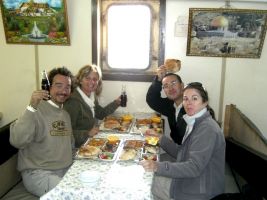
New year dinner with Lionel and Valerie.
Together with a couple of French friends, who in three years have travelled around the world in their white Land Rover, they force us to have the “Meal” at 17:30.
Sudanese food isn’t bad, meat based with potatoes, rice oranges and chapatti.
Simple and “agreeable”.
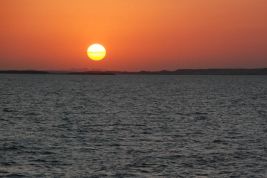
Farewell to the last sunset
There is a cold wind blowing but we stay outside nevertheless to watch the panorama.
During the night we cross the frontier between Sudan and Egypt.
We will be passing by the famous temple of Abu Simbel, which has been moved and saved from the waters; we will see it by car.
The man-made lake, made from the waters of the Nile looks like the sea as we see our last sunset in Africa on this trip.
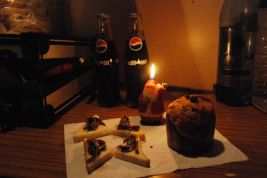
Happy New Year
It’s midnight!
In the cabin, we celebrate with what we were able to get our hands on; anchovies from Kenya, a panettone from Ethiopia, Bread from Sudan, and Father Christmas from Italy.
In Sudan alcohol is prohibited.
Therefore… no bang, just the “sfshhhh…”
Happy New Year!
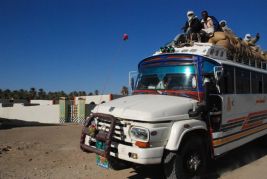
Impressions
A delicate country.
Instability problems and abuse of power in Darfur and the south.
On the walls in the north there are many writings in Arabic and English saying: “Nubia=Darfur2” and “Stop kill Nubia people”
It has access to the sea and borders nine countries; the frontiers are closed off with Kenya and Eritrea. Chad, Central African Republic, Congo Zaire, Libya and Uganda crossings are almost impossible and are not recommended.
Only Ethiopia and Egypt are fully open.
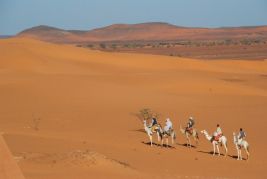
It isn’t a place where one can move around easily. You have to make sure that all the necessary permits and registrations have been done.
Not all roads can be crossed.
Authorization is a must have; in many areas we aren’t given any.
Nevertheless, we found the authorities polite and available.
They try and avoid creating problems for tourists and always endeavour to present a good image of themselves; I must say that in this area they succeeded.
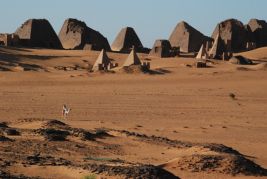
The police kindly and quickly go through all the formalities and are often satisfied with just a photocopy of the visa and the passport.
As long as we get them ready, then we waste no time at all.
Contrary to the foreigners who live here, they are controlled and watched a lot more; the law on the prohibition of alcohol is also applicable to them within certain limits. Recently, an Italian held a party in his house with alcohol and some guests who were local girls. There was a police raid and for a few days he became a guest of the Sudanese government, the few bruises on his back will help further to remind him for the future.
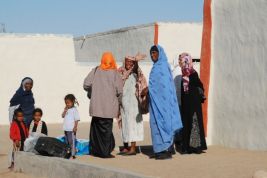
You also have to be careful when taking pictures; it is probably best, just to not take any.
The people are generally upbeat and polite.
The country is safe; you can camp outside the city with a certain amount of security. Religion is the backbone of the country, well, at least for the people.
Whether it is a pure devotion or just for manipulative purposes, it isn’t easy to distinguish.
The Islamic “Sharia” law is strictly applied. Women are strictly covered, even though we have seen some as police officers.
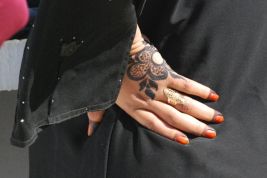
In the kitchen, we have made unworthy use of the Tamiya.
Crunchy chickpea meatballs and herbs that they “peddle” on every street corner;
Unbelievably addictive.
Signs, beer and curiosities
Only this bogus alcohol free beer; horrible, and a pedestrian crossing road sign in the middle of the desert!
